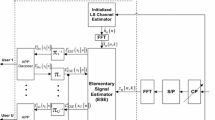Abstract
In this paper we develop an adaptive MIMO channel estimation algorithm for space–time block coded OFDM systems. The presented algorithm is based on Expectation Maximization (EM) technique by decomposing the superimposed received signals into their signal components, and estimating the channel parameters of each signal component separately. We also study and compare our proposed EM-based algorithm with a previously introduced recursive-least-squares based algorithm for MIMO OFDM systems. At each iteration the EM algorithm decomposes the problem of multi-channel estimation into channel estimation for each transmit–receive link. In this paper we also study the Doppler spread tolerance of our proposed algorithm in a fast fading environment, and investigate how it affects the system BER performance.
















Similar content being viewed by others
References
Alamouti, S. (1998). A simple transmit diversity technique for wireless communications. IEEE Journal on Selected Areas in Communication, 16(8), 1451–1458.
Feder, M., & Weinstein, E. (1988). Parameter estimation of superimposed signals using the EM algorithm. IEEE Transactions on Acoustics, Speech, and Signal Processing, 36(4), 477–489.
Mazet, L., Buzenac-Settineri, V., de Courville, M., & Duhamel, P. (2003). EM-based semi-blind estimation of time-varying channels. IEEE Workshop on Signal Processing Advances in Wireless Communications, ISBN: 0-7803-7858-X, 205–209.
Zhuang, X., & Vook, F. (2002). Iterative channel estimation and decoding for a turbo-coded ofdm system via the EM algorithm. Proceedings of the IEEE International Conference on Acoustics, Speech, and Signal Processing. Orlando, USA, May.
Younis, W. M., & Sayed, A. H. (2003). Efficient adaptive receivers for joint equalization and interference cancellation in multiuser space–time block-coded systems. IEEE Transactions on Signal Processing, 51(11), 2849–2862.
Linnartz, J.-P. Wireless and mobile communication, Doppler multipath channel. JPL’s Wireless Communication Reference. Retrieved from http://www.wirelesscommunication.nl/reference/about.htm.
Karkhanechi, H. M., & Levy, B. C. (2006). EM-based channel estimation for space time block coded MIMO OFDM systems. Proceedings of the IEEE SIPS Conference. Canada, October.
Zou, H., McNair, B., & Daneshrad, B. (2001). An integrated OFDM receiver for high speed mobile data communication. GLOBECOM, 1, 3090–3094.
Belloni, F. Fading models. HUT: S-88 Signal Processing Laboratory.
Hourani, H. (2004). An overview of diversity techniques in wireless communication systems. Radio Communications, Technical Report, Helsinki University of Technology.
Zhao, Y., & Haggman, S.-G. (1996). Sensitivity to Doppler shift and carrier frequency errors in OFDM systems—the consequences and solutions. IEEE Vehicular Technology Conference, 3, 1564–1568.
Zamiri-Jafarian, H., & Pasupathy, S. (1997). Recursive channel estimation for wireless communication via the EM algorithm. Proceedings of the IEEE International Conference on Personal Wireless Communications. Mumbai, India, 17–19 December.
Younis, W. M., & Sayed, A. H. (2004). MIMO space–time block coded receivers over frequency selective fading channels. In IEEE Workshop on Signal Processing Advances in Wireless Communications, ISBN: 0-7803-8337-0 (pp.396–400).
Zhao, Y. (1999). An EM algorithm for linear distortion channel estimation based on observations from mixture of Gaussian sources. IEEE Transactions on Speech and Audio Processing, 7(4), 400–413.
Cozzo, C., & Hughes, B. (2000). Joint channel estimation and data symbol detection in space–time communications. IEEE International Conference on Communications, 1, 287–291.
Aldana, C. H., & Cioffi, J. (2004). Channel tracking for multiple input, single output systems using EM algorithm. IEEE International Conference on Communications, 2, 586–590.
Author information
Authors and Affiliations
Corresponding author
Rights and permissions
About this article
Cite this article
Karkhanechi, H.M., Levy, B.C. An Efficient Adaptive Channel Estimation Algorithm for MIMO OFDM Systems—Study of Doppler Spread Tolerance. J Sign Process Syst Sign Image Video Technol 56, 261–271 (2009). https://doi.org/10.1007/s11265-008-0228-0
Received:
Accepted:
Published:
Issue Date:
DOI: https://doi.org/10.1007/s11265-008-0228-0




